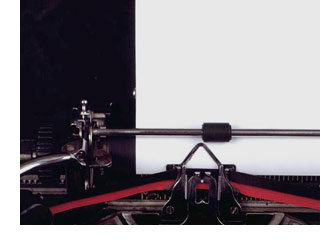 Blogging - Is it worth doing? From general comments I have heard across the photography community then the answer is mostly yes! Do it. One thing is for certain, if a photographer is known to have a blog then few people think that's a bad thing.
Blogging - Is it worth doing? From general comments I have heard across the photography community then the answer is mostly yes! Do it. One thing is for certain, if a photographer is known to have a blog then few people think that's a bad thing.
Even if a blog or photoblog is not up to the standard of your usual work it is often seen as a sandbox for experiments or a place to bounce creative ideas off the wider photo community. Blogging on a photography or microstock related topic is a great way to 'learn through teaching'.
You don't have to be a novelist or trained in writing to blog, in fact the original idea of a 'photoblog' was a regularly updated page and archive gallery of past photos, each with just a title and short description. Most photographers however don't create photoblogs these days, instead creating a blog with posts which are rich in images with a little text along with each one, or a series of image posts interspersed with comment, stories or recent ideas etc.
You could create a gallery of your work online, but the reason blogs are so popular is their ease of upload and ability to form networks of related blogs though comments and trackbacks. Galleries are simple to add images to often have a disadvantage of feeling like browsing through a directory tree of thumbnails on a computer, it's difficult to make a gallery feel 'alive' or tell a story.
Benefits: if done properly blogging can:
- Create a network of photographers who are interested in the same subjects you like to shoot.
- Inspire creativity (which can be thin on the ground in the stock photo world).
- Gives you somewhere to promote your work, people who read your blog can 'read more about me' and see links to your microstock work.
- Creates targets and challenges, e.g. a new photo each week or day, or (common for microstockers) a post each month about earnings with the aim of earning successively more each month)
- Produce a handy journal of places you visited, shoots you organised or subjects of your photo studies.
Disadvantages:
- Takes a lot of time to set-up.
- Can be difficult and frustrating to set-up if you do not have a reasonable knowledge of 'internet technology'.
Blogging Platforms
Where to blog... well you could start with flickr, and create a photostream, it's not exactly your own blog, but it is at least a URL which you can use when you post comments on blogs and forums. It's a simple way to display your photography.
Wordpress.com, Tumblr and Blogger.com offer hosted accounts where you can access their well developed blog platform and produce a presence online using the templates and plugins which they provide.
A self hosted blog is the most flexible option, but more difficult to set-up. Wordpress is not the only platform available (see Wordpress.org) there are lots of other Blog CMS (content management systems) that you could use, some free or "open source" and some with more professional features available at a cost. Read more about photography site CMSs.
Things all good photography sites and blogs have...
If you do go into creating your own blog or photo site then the standard rules of the internet apply, good page titles, descriptions, keywords/tags etc. (read our post on SEO for photography sites for more on this subject). In addition to that, any site should also contain:
- About page - who you are, a creative statement about your work and how you can be contacted.
- Contact - a page with contact info such as your phone, but also an online form for people to send you an e-mail.
- FAQ / Help - this one is perhaps optional for the smaller site, but is a place you can direct 'lost visitors' to the most important parts of your site, and let them know what you are trying to achieve with your site.
- RSS Feed - an important way of letting visitors 'subscribe' to your site so that they are notified when you update it.
- If Relevant: links to your microstock portfolios so that buyers can look at more of your work.
Blogging Tips
 Write about something you are interested in, and consider something other than what you do full-time. Remember that six months down the line you will still need to be interested in the subject. There is a tricky balance in keeping your subject and blog name generic enough to allow your interests to grow but also a specific enough topic to keep people interested... "oh no, another photography tips blog". Blogging can be a good way to stretch yourself into doing something you have a fear of but want get better at.
Write about something you are interested in, and consider something other than what you do full-time. Remember that six months down the line you will still need to be interested in the subject. There is a tricky balance in keeping your subject and blog name generic enough to allow your interests to grow but also a specific enough topic to keep people interested... "oh no, another photography tips blog". Blogging can be a good way to stretch yourself into doing something you have a fear of but want get better at.
If your website contains anything dynamic (i.e. it is more than just plain html) like a Wordpress blog then always keep your software and plugins up-to-date. Old versions of CMS software can contain bugs which may allow a hacker to access your site. It happened to me a while back with a Wordpress blog. The hack was done in a very stealthy way so that normal access to the site revealed nothing out of the ordinary, only a search on google for site:mydomain.com revealed that I was also serving up thousands of spam pages linked to other blogs infected by the same hackers. The solution was simple, I just had to restore one file from my back-ups (easy to spot as the size was different, but then it took many hours to confirm that no other files or templates had been 'seeded' with back doors). The first I knew of the issue was when google webmaster tools informed be that my site was being de-listed for containing so many spam links, and while my response to google explaining the resolution of the issue resulted in the blog remaining in the search engine, it has taken months for the search engine traffic to build back up (and has still not reached previous levels). Such an event can, if you are not careful result in your domain being blacklisted all together, and as such can ruin your business or virtually stop any new search engine visitors from seeing your blog. The more popular your blog the more likely the hackers will want to break in.
Related Posts
CMS Software for Photographers



Aminus3 Photoblog Hosting
Jason (not verified) on Tue, 2009-02-17 09:45Time to setup... nooo
Ivan (not verified) on Mon, 2009-03-16 01:46If you have done it before....
Steve Gibson on Tue, 2009-03-17 05:53I agree with that, hostgator, new account, cpanel, fantistico, wordpress and write your first post less than 30 minutes, but there is a big BUT, only if you have done that before and know what your are doing. Yes, most of the work is in writing new content for your site, But i'd always manually install the chosen CMS, i watched fantastico mangle a gallery installation a few years back and never want to repeat that (it was at a time when i did not know what the .htaccess file was all about and couldn't repair it). Then I would take a couple of days to configure fully (depending on the size of the site) to turn it into something that does not look like a default install, and has everything a decent web presence should.
Needs: There is a growing list, as long as your arm of things that a site needs or really should have if you mean business. Many of them are available by default or quite easy to plug in, but most of them need to be configured and tested, without spending all this time you will end up with a site that people don't like to use because the navigation is off, the rss feed doesn't enclose images or it posts new content for everything you post to the site like when you change a typo on a static page, there are lots of sites sloppy looking sites out there that do that, I find it enough work posting new content and proof reading everything.
I'd whole heartedly recommend people do start their own site! and agreed these days that most people can jump straight into having a blog and skip the static html. the learning curve is very steep! if you have never done it before, a lot of photographers are quite technically minded these days. You can be sure that fantistico will do something 'special' with your database when it does an auto upgrade, or you hosts will move to php 5 and cause everything to be replaced by a white screen of death, but I guess that's just learning.
nice work on the blog btw - looks good (despite what I was saying above!)
If you plan on creating a
Anonymous (not verified) on Mon, 2010-06-21 22:14own the domain
Steve Gibson on Sun, 2010-06-27 00:23I certainly would NOT agree that hostgator were the best / cheapest (nothing wrong with them either apart from the price), there are many other reliable hosts for a basic website - i'd go with justhost as being pretty much cheapest at the moment (with the caveat that if you throw a heavy weight content management system and a moderate level of traffic into the mix they are likely to suspend your account - as are all cheap shared hosts). Shop around, it depends on what you want to do, something every webmster will have to do sooner or later is move their site to a new hosting company
Agreed, owning the domain is critical, and in the log run its often better to manage your domain and delegate it to your hosting provider through a separate company e.g. the domain managed at godaddy or uk2 and the hosting of the website somewhere else. this offers more flexibility and avoids being tied in with a 'free domain' offer.
A clear plan of where you want to go with each website is important, even if for a first site its just "I want to get my work online, and learn about issues/pitfalls related with running a site". learning instead of making money is a perfectly good reason to setup a site.
Wow, your suggestions really
Moktah (not verified) on Fri, 2012-09-28 07:56